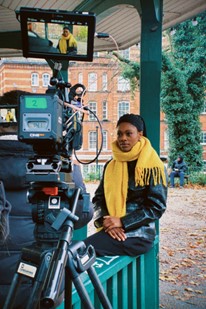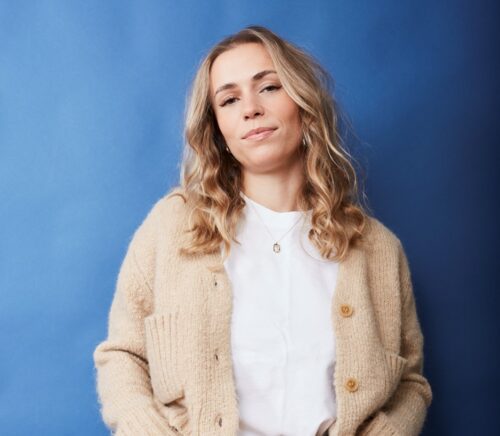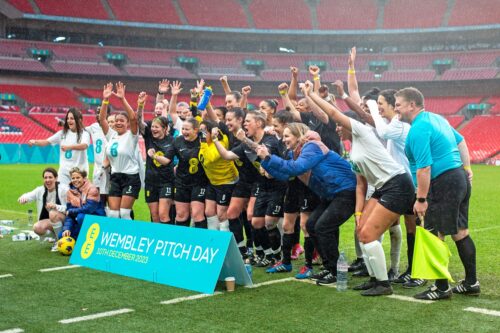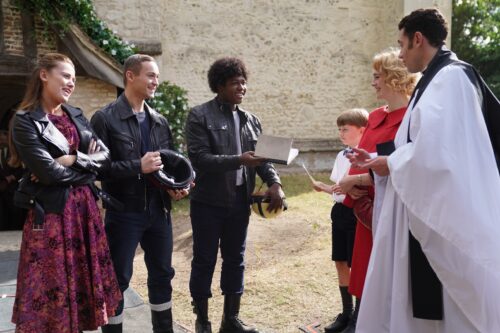This month we are delighted to share an interview with the founder of The Deaf Set, representing and advocating for deaf talent throughout the creative industry.
1. You grew up in a family of deaf creatives. How did that affect your choice of career and/or your decision to set up The Deaf Set?
Growing up in a family of deaf creatives has definitely impacted my career choices. My mum (Jean St. Clair) has always been a huge role model and inspiration to me so I always knew my career would follow in my mum’s footsteps in some way.
2. You worked as an interpreter across the creative industries before you set up your own business. What was your journey to that point, and what was your experience like as an interpreter?
I started working as a CSW (Communication Support Worker) from the age of 19 and have worked as an interpreter for over 10 years, specifically in the media industry and I have always enjoyed it. I can’t say too much more about it as it’s all confidential work
3. You then set up The Deaf Set, an organisation with a mission to bridge the gap between the deaf community and the mainstream media. What prompted you to found this business? What did/do you hope to achieve?
Through working in the industry and from growing up with a mother who works as a deaf actress, I could see there was a disconnect between the industry and the deaf community. Often people would ask me where they could find deaf actors, and I would say they needed to go on Facebook and look for actors or reach out to the few actors who had agents at the time. It felt unfair that deaf people weren’t getting the same exposure as hearing people could. I felt confident that the industry wanted to work with deaf actors/creatives so I decided to set up The Deaf Set, to try and make that process seamless.
4. How has The Deaf Set grown? What were your early experiences like running the company, and what is it like now?
We are only 3 years old but we have grown a lot. We’ve worked with big clients such as BBC, Netflix, ITV, Channel 4, Apple TV, Amazon Prime etc. all in a consultancy capacity. We now exclusively represent 12 actors and the actors are doing really exciting work – we’ve had actors working in lead roles on major tv shows with BBC and Netflix. We’ve also recently expanded into the world of football which I personally love as I play football myself. We’ve worked with The England Men’s team, the Lionesses, GB National Teams, Premier League teams and TNT sports. We used our connections in the football world to set up a deaf women’s football match at the iconic Wembley Stadium. It was such a fantastic day, we always want to be able to use our connections to give back to the community when we can.
Running a company isn’t easy but it is the most rewarding work I have ever done. When I see a deaf actor get a role, it’s the best feeling to know that setting up this company has made a difference. I also really enjoy when a production brings the right deaf team on board and you see a show portray deafness authentically.
5. We talk a lot about representation in the media, and of course having visible deaf role models is important. However, you represent and encourage a wealth of talent that goes beyond actors – can you tell us more about that aspect of The Deaf Set and why it is important?
Representation on screen is really important – people should be able to see themselves represented but equally, you can’t just have on screen representation and not have any diversity in the writers rooms or in the crew. So we really encourage productions to also hire deaf crew/creatives.
6. The Deaf Set offers representation to talent within the creative industry, but that’s not the only thing you offer. Can you tell us a bit more about the other parts of the business, like consultancy and deaf awareness training, and why you chose to make them part of The Deaf Set’s overall offering?
At The Deaf Set, we have a holistic approach where we ensure the whole process of working with deaf talent is seamless. For example: if a production has hired a deaf actor, we can provide the production with an interpreter for the shoot so the access is covered but we also provide consultants who have extensive experience working in the media industry (e.g. s script consultant or a BSL consultant) to ensure the BSL being used is clear on screen. There may be a hearing actor who needs to use BSL for their character, and so we will provide the production with a BSL teacher/consultant to teach the actor.
We also provide deaf awareness training to the crew, so before the actor goes on set, everyone has an understanding of best practices and this means the actor can focus on what they are there to do, which is to act! The actor shouldn’t worry about whether people will know to not speak to the interpreter and to face the actor, or if the script will have inappropriate language use, or if the hearing actor is using the wrong BSL. It is not the actor’s responsibility to be a consultant.
7. Do you have any advice you’d give to young deaf people wondering about a career in media, or even setting up their own business?
If you are interested in working in the media industry, look at courses online, network with people in the industry, and ask loads of questions! If you want to be an actor, joining acting workshops with Deafinitely Theatre is a great place to start, and RADA often provides workshops that are BSL interpreted. Get a headshot, even if it’s taken on a friend’s camera. Join Spotlight – it’s vital to be seen by casting directors. Reach out to acting agents and see if they’re looking for new talent to join their roster. If you don’t have a showreel, film a self-tape/monologue at home and show this to people in the industry. Be relentless as it’s a tough industry!
If you want to start your own business, I didn’t really do it the conventional way – my ADHD meant I just did it and hoped for the best! I didn’t do much research, I just set up a website and winged it and that really worked for me. But if you want to set up a business, I would recommend doing research and making sure your overheads aren’t too expensive to start with. Having passion is really important because in the beginning it will be a lot of work with not much reward but if you keep at it and you have passion, it will hopefully be a success.
8. What is your vision for The Deaf Set for the future? What would you like to achieve and where do you see the company in 5 and 10 years time?
 The Deaf Set’s biggest mission is to have deaf actors/creatives working seamlessly in the mainstream media industry. For casting directors and productions to always be thinking if a deaf person could play this role and for it to be the norm to see deaf actors/creatives everywhere. We would love to see more deaf involvement in productions from the very beginning and not brought on as a consultant later down the line.
The Deaf Set’s biggest mission is to have deaf actors/creatives working seamlessly in the mainstream media industry. For casting directors and productions to always be thinking if a deaf person could play this role and for it to be the norm to see deaf actors/creatives everywhere. We would love to see more deaf involvement in productions from the very beginning and not brought on as a consultant later down the line.
I am excited to see where the next few years will take us!



